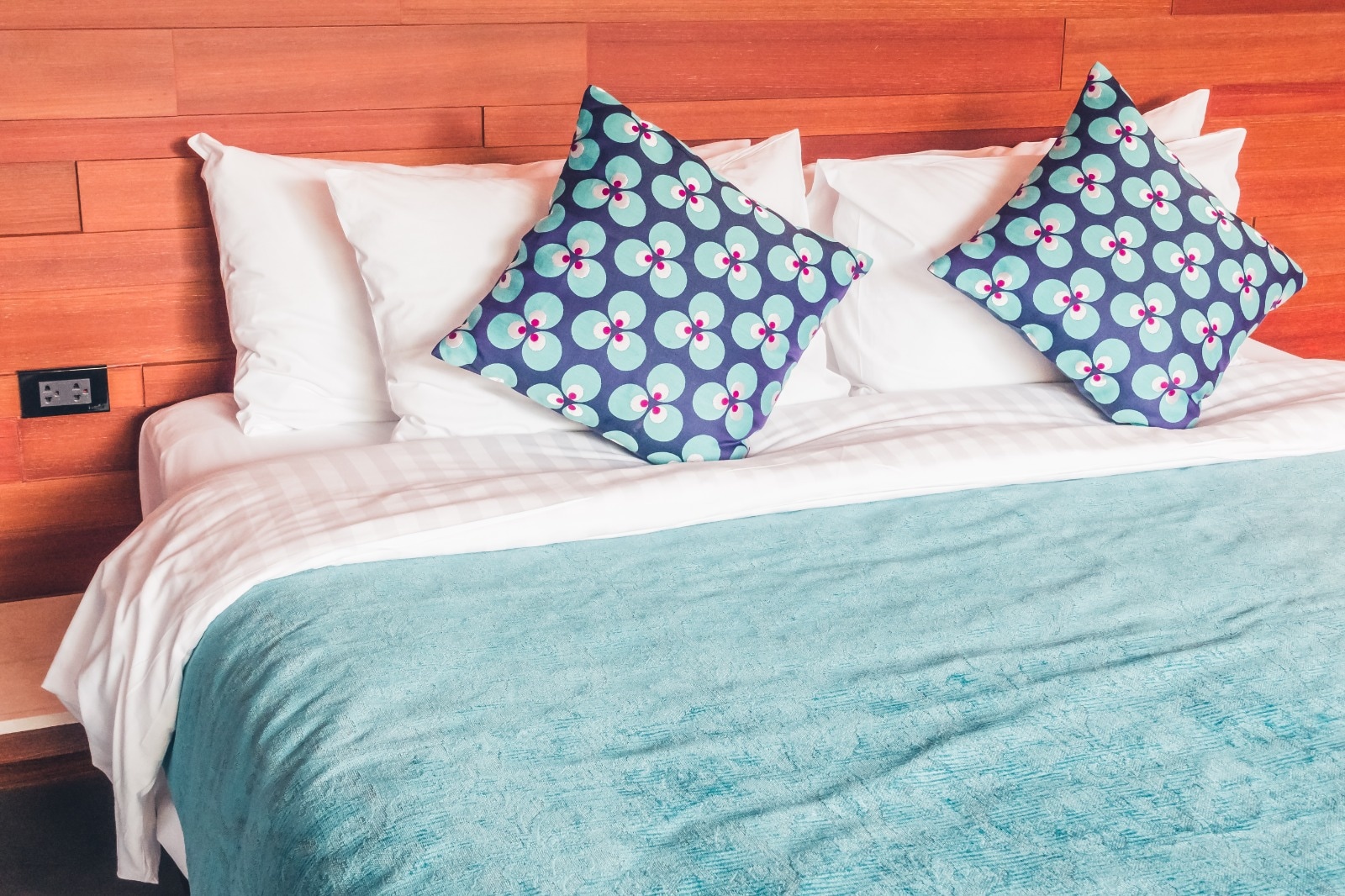The Impact of Bed Sheets On Sleep Quality: What You Need to Know
Your choice of bed sheets can make or break your sleep quality. The right fabric, weave, and breathability can create a comfortable environment.

The Impact of Bed Sheets On Sleep Quality
You may invest in the perfect mattress, adjust the room temperature, and even limit screen time before bed but if you're overlooking your bed sheets, you could be missing a key factor in achieving quality sleep. The texture, breathability, and overall fabric choice of your sheets can significantly influence your comfort levels, body temperature, and sleep duration. A poor choice in bed sheets can leave you tossing and turning, feeling too hot, too cold, or simply not at ease. On the other hand, the right sheets can help regulate temperature, improve breathability, and enhance relaxation, leading to deeper, more restful sleep. Let's explore how bed sheets affect sleep quality, which materials to consider, and how to make the best choices for your nightly comfort.
Also Read: Buying Bedsheets Online? Don't Miss These 8 Must-Know Tips For Quality And Comfort
1. How Do Bed Sheets Influence Sleep Quality?
While they might seem like a minor detail, bed sheets play an essential role in creating the ideal sleep environment. Their impact goes beyond aesthetic comfort, temperature regulation, breathability, and skin sensitivity, all depend on the type of sheets you use.
Poor-quality Bed sheets may trap heat, feel rough against the skin, or even cause allergic reactions. High-quality sheets, on the other hand, provide a soft, soothing feel, allow for airflow, and reduce disturbances, ensuring that you sleep uninterrupted.
2. The Importance Of Fabric Choice
Different fabrics offer varying levels of comfort and breathability, which can directly affect how well you sleep. Here are some of the most common materials and their benefits:
Cotton – Soft, breathable, and great for all seasons, especially when using long-staple varieties like Egyptian or Pima cotton.
Linen – Lightweight and excellent at absorbing moisture, keeping you cool in warm climates.
Silk – Ideal for sensitive skin, providing a smooth and luxurious feel while regulating body temperature.
Microfibre And Polyester – Affordable and durable, but less breathable, which may lead to overheating.
Bamboo – Naturally hypoallergenic, moisture-wicking, and ultra-soft, promoting a cool and comfortable sleep.
3. Thread Count: Is Higher Always Better?
Thread count refers to the number of threads per square inch of fabric, often marketed as a key indicator of sheet quality. However, a higher thread count doesn't always mean better sheets.
Bed Sheets with a thread count between 200 and 400 generally offer a good balance of softness and breathability. While ultra-high thread counts (600+) may feel smoother, they can also trap heat and reduce airflow, making them *less suitable for warmer climates. Instead of focusing solely on thread count, consider fabric quality and weave when choosing bed sheets.
4. Weave Type And Its Effect On Comfort
The way a fabric is woven determines *texture, breathability, and durability, impacting how it feels against your skin. Common weave types include:
Percale– Crisp, lightweight, and highly breathable, ideal for warmer temperatures.
Sateen – Silky smooth with a slight sheen, providing a softer feel but slightly less breathable.
Jersey Knit – Stretchy and cosy, similar to T-shirt fabric, ideal for casual comfort.
Twill – Durable with a diagonal weave, offering added warmth and longevity.
5. Temperature Regulation: Keeping Cool Or Staying Warm
Your bed sheets can trap or release heat, impacting body temperature and sleep quality. Breathable fabrics like cotton, linen, and bamboo allow airflow, preventing overheating and keeping you cool throughout the night.
Meanwhile, sateen and flannel sheets provide extra warmth, making them better suited for colder months. If you struggle with temperature regulation, opt for moisture-wicking fabrics such as bamboo or linen, which help absorb sweat and promote comfort.
6. Hypoallergenic Sheets For Sensitive Sleepers
If you suffer from skin allergies, sensitivities, or asthma, choosing hypoallergenic bed sheets can reduce irritation and improve sleep quality. Materials like bamboo, silk, and organic cotton are naturally resistant to dust mites, mould, and bacteria, making them ideal for allergy-prone individuals.
Additionally, washing your sheets regularly in hot water helps eliminate allergens, ensuring a clean and healthy sleep environment.
7. Proper Maintenance To Extend Sheet Longevity
Well-maintained sheets not only feel *better* but also last *longer*, retaining their softness and breathability. Follow these care tips:
- Wash regularly (once a week) to remove dirt, sweat, and allergens.
- Use mild detergents to prevent fabric damage and irritation.
- Avoid fabric softeners on natural fibres, as they can reduce breathability.
- Air dry when possible to maintain texture and durability.
- Rotate sheets between sets to prevent excess wear and fading.
Proper care ensures that your bed sheets continue enhancing sleep comfort rather than deteriorating over time.
8. Choosing The Right Sheets For Every Season
Your sheets should adapt to seasonal changes, ensuring optimal comfort year-round. Here's how to match them to the weather:
Summer: Lightweight, breathable fabrics such as linen and bamboo keep you cool.
Winter: Warmer, insulating materials like flannel or sateen cotton trap heat.
Spring And Autumn: Versatile options such as percale cotton or jersey knit balance comfort in moderate temperatures.
Adjusting your bedding according to the season prevents discomfort, helping you sleep better regardless of climate shifts.
9. Final Tips For Choosing The Best Bed Sheets
To ensure quality sleep, here's a quick checklist when shopping for bed sheets:
- Opt for natural, breathable fabrics such as cotton, linen, or bamboo.
- Look for thread counts between 200–400 for comfort and durability.
- Choose hypoallergenic materials if you have allergies or sensitivities.
- Match your sheets to your sleep needs: cooling, warmth, or softness.
- Maintain them properly with regular washing and gentle care.
Small changes to your bedding can have a significant impact on sleep quality, ensuring that every night feels restful and rejuvenating.
Products Related To This Article
1. haus & kinder Pink & White Printed Cotton 186 TC King Bedsheet
2. DDecor Yellow & White Floral 144 TC Cotton Queen Bedsheet
3. haus & kinder Unisex Blue Bedsheets
4. DDecor Beige Striped Cotton 210 TC King Bedsheet
5. BOMBAY DYEING Thyme White Floral Cotton 210 TC King Bedsheet Set
6. BOMBAY DYEING Printed Cotton King Bedsheet
7. DDecor Blue & Green Abstract Cotton Double King Bedsheet
8. haus & kinder White & Pink Floral Cotton King Bedsheet
9. DDecor White & Yellow Floral 140 TC Cotton Queen Bedsheet
10. haus & kinderWhite & Pink Geometric Cotton King Bedsheet
Frequently Asked Questions (FAQs)
1. How do bed sheets affect sleep quality?
Bed sheets influence sleep quality by controlling temperature, breathability, and comfort. The right sheets help regulate body heat, wick away moisture, and provide a soft, soothing texture for uninterrupted sleep. Poor-quality sheets can lead to overheating, irritation, or disrupted rest.
2. What are the best fabrics for sleep-friendly bed sheets?
Natural fabrics like cotton, linen, bamboo, and silk are excellent for breathability and comfort. Cotton is versatile for all seasons, while linen and bamboo wick moisture to keep you cool. Silk is gentle on the skin and helps regulate body temperature, making it a luxurious choice.
3. Does thread count matter when buying bed sheets?
Thread count matters, but higher isn't always better. A range of 200–400 provides softness, breathability, and durability without overheating. Ultra-high thread counts may feel luxurious but can trap heat, making them less suitable for warmer climates. Fabric quality is more important than thread count alone.
4. How often should bed sheets be washed for optimal sleep hygiene?
For the best sleep hygiene, bed sheets should be washed once a week to remove dirt, sweat, and allergens. Using mild detergents and avoiding harsh fabric softeners preserves the sheet's softness and breathability. Regular washing prevents bacteria buildup and promotes a healthier sleeping environment.
5. What type of sheets are best for different seasons?
In summer, lightweight and breathable sheets like linen or bamboo keep you cool. For winter, warmer fabrics such as flannel or sateen cotton provide insulation. Choosing seasonally appropriate bedding helps maintain ideal body temperature for a restful night's sleep.
The impact of bed sheets on sleep quality is often underestimated, yet they play a fundamental role in how comfortable and well-rested we feel each morning. From fabric choice and weave type to temperature regulation and seasonal adaptation, selecting the right sheets ensures that your sleep environment is optimally designed for relaxation.
Next time you struggle with disrupted sleep, consider whether your bed sheets might be the culprit. Investing in high-quality, breathable sheets isn't just about luxury, it's about improving well-being, comfort, and the quality of your rest.
Disclaimer: The images used in this article are for illustration purposes only. They may not be an exact representation of the products, categories, and brands listed in this article.
















